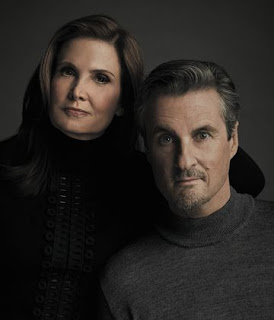L.R. Dorn (the pseudonym of screenwriters Matt Dorff and Suzanne Dunn) is the author of the new novel With a Kiss We Die. They also have written the novel The Anatomy of Desire.
Q: What inspired you to write With a Kiss We Die?
A: The intersection of two ideas, first to create a book series featuring a podcasting crime journalist and second a real-life murder case from 1985 that transfixed us. We matched our investigator character to a fictionalized version of this “true crime” and off we went.
Q: The writer Megan Collins said of the novel, “In this riveting novel that expertly mimics the pace and pulse of a podcast, L.R. Dorn examines the ethical boundaries of true-crime journalism, the intoxicating influence of love, and what happens when passion turns to poison.” What do you think of that description, particularly as it relates to the pacing of a podcast?
A: Lovely blurb, thank you Megan! The only word we might adjust is “mimics” because we worked hard to transcend the style and format of a real true crime podcast.
Yes, we include things like episode titles and cold opens, but we wanted the investigation narrative to have a more novelistic expression in terms of its complexity and sense of immediacy.
The first-person present tense can be a powerful tool to put the reader in-the-moment, in this case shadowing our journalist as she meets and then develops a personal relationship with her subjects.
We also wanted to construct a parallel meta view of how this kind of audio journalism is done.
The back and forth talk on journalistic ethics is a recurring thread that’s
meant to bring the reader into a conversation that usually happens when the
microphones are off. Our host and co-host are constantly questioning their choices about how to tell this story and where the
line stands between objectivity and advocacy.
Q: In our previous interview, you described your collaboration process as “Talk, talk, write, write, read, read, rewrite, rewrite. That’s literally how we do it.” Was it the same this time around?
A: The talking part is the backbone because there are two of us and we can spark each other to make our work go bigger, deeper, further. Because there are two sets of eyes on every word, sentence, paragraph, we have our own process of checks and balances.
As two storytellers working on the same story, we will occasionally (insert wry smile emoji) bump against each other, but we always try to reason out what’s best for the story.
Oh, and one of us comes from a more male perspective and the other from a more female perspective. We’re looking for a gender blended style that includes and synthesizes both perspectives. Now that can get tricky!
Q: Without giving anything away, did you know how the novel would end before you started writing it, or did you make many changes along the way?
A: We knew from the beginning we wanted to reach a resolution but at the same time let questions linger.
With a Kiss We Die is an exploration of the boundary between truth and lies, that vast gray zone between black and white. There’s the truth we tell ourselves and the truth we tell other people, and often they are not the same. The differences can be small, large, or somewhere in between.
And this underlines the challenges for a truth-seeker, particularly a professional one – a journalist.
In the “Bonus Content” section (another nod to the podcast medium), our crime podcaster finishes the season with a monologue where she looks back on the case, talks about how it affected her, and voices the questions she still has. Those are the questions we want the reader to sit with after they close the book.
Q: What are you working on now?
A: A few things. A sequel to With a Kiss We Die, which features Ryanna Raines investigating a shocking murder case and this time the victim is a close friend and colleague.
We’re also exploring another audio transcript concept, our second reimagining of a modern literary classic.
And we’re working on a couple of traditionally written novels, one a historical love story about a never-before-told affair between two very famous people and the other a political thriller about a female president who suspects her husband is cheating with a foreign agent.
Q: Anything else we should know?
A: We really enjoy the “multi-voice performance” style of fiction writing. Our last book, The Anatomy of Desire, was a finalist for the Audie Award in this category.
We compose a mix of interactive dialogues and monologues to unfold the narrative. We see each voice as a separate instrument and we try to create a symphonic effect with both harmonies and dissonances.
The literary constraints of multi-voice-performance constantly challenge us to
figure out how to tell the story and explore the characters through contrasting
points-of-view. Most days we know what we want to say. The question is how to say it.
--Interview with Deborah Kalb. Here's a previous Q&A with L.R. Dorn.


No comments:
Post a Comment